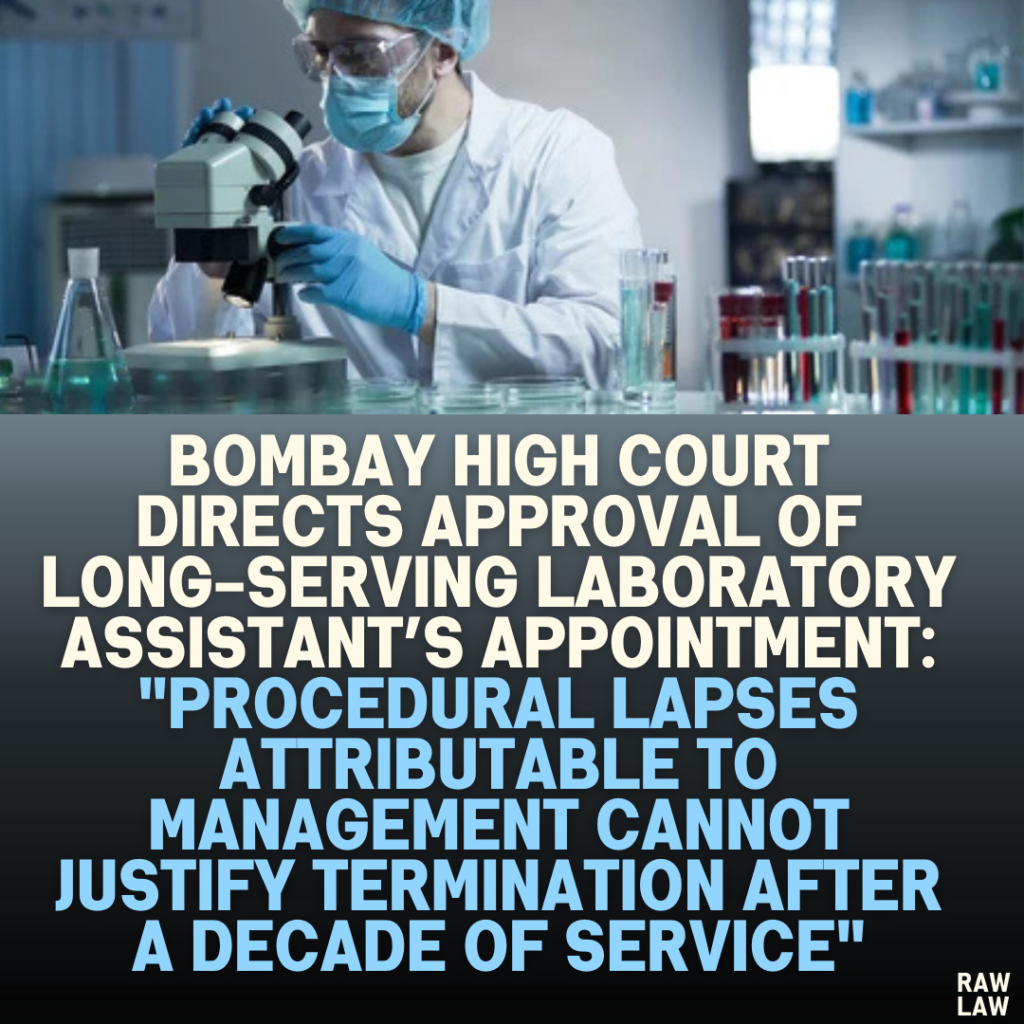Court’s Decision
The Bombay High Court quashed the order passed by Respondent No. 3 that rejected the approval of the petitioner’s appointment as a Laboratory Assistant. The court directed Respondent No. 3 to approve the appointment within 30 days. Additionally, a cost of ₹50,000 was imposed on Respondent Nos. 4 and 5 for lapses in the recruitment process. The court ordered that this cost be paid to the Kirtikar Law Library.
The court held that the petitioner’s uninterrupted service for over a decade and the procedural lapses being attributable to the school management did not justify the rejection of approval or the termination of the petitioner’s employment.
Facts of the Case
- Appointment Process:
- In 2012, after the retirement of the previous Laboratory Assistant, Respondent Nos. 4 and 5 initiated a recruitment process.
- A public advertisement was issued in the widely circulated newspaper “Sakal,” and the petitioner, who was eligible and qualified, was selected and appointed on July 11, 2012.
- Approval Issues:
- The school sought approval from Respondent No. 3, who initially did not accept the proposals. In 2022, Respondent No. 3 formally rejected the proposal, citing non-compliance with government regulations.
- Litigation History:
- The petitioner filed a writ petition in 2022, resulting in a court directive to reconsider the proposal. Despite this, Respondent No. 3 reaffirmed the rejection.
- The petitioner then filed a contempt petition, leading to the present writ petition challenging the rejection order.
- Grounds for Rejection by Respondent No. 3:
- Advertisement for the post was not published in two newspapers, as mandated.
- No prior permission was obtained from authorities before initiating the recruitment.
- A backlog of reserved category posts existed, which was not addressed before appointing the petitioner in the open category.
Issues Addressed by the Court
- Was the rejection of the petitioner’s appointment justified based on the procedural lapses cited?
- Did the petitioner’s uninterrupted employment since 2012 warrant judicial intervention to prevent injustice?
Petitioner’s Arguments
- The petitioner argued that the irregularities cited were minor and attributable to the school management, not the petitioner.
- The petitioner contended that he fulfilled all eligibility requirements and had been working uninterruptedly for over 10 years.
- The procedural requirements, such as advertising in two newspapers, were not mandatory but directory, serving only to ensure transparency.
- It was further submitted that no surplus employees were available to be absorbed, as confirmed by Respondent No. 3.
Respondent’s Arguments
- Respondent No. 3 argued that procedural lapses, including the failure to obtain prior permission and the backlog of reserved category posts, invalidated the petitioner’s appointment.
- It was contended that these lapses were violations of mandatory government resolutions and therefore justified the rejection of the proposal.
Analysis of the Law
The court examined the legal framework governing public employment and concluded:
- Procedural Lapses:
- The requirement of advertising in two newspapers was directory and not mandatory. The court noted that the advertisement was issued in “Sakal,” a newspaper with wide circulation, and this fulfilled the underlying purpose of the rule.
- The failure to obtain prior permission was a lapse attributable to the school management, not the petitioner.
- Proportionality and Justice:
- The court emphasized the principle of proportionality, holding that procedural irregularities should not lead to severe consequences like terminating a long-standing employment unless they undermine the integrity of the selection process.
- The petitioner’s continued service for over 10 years without any allegations of misconduct or fraud strengthened the case for approval.
- Reserved Category Backlog:
- While acknowledging the backlog, the court clarified that the petitioner’s appointment did not impact reserved category vacancies. However, the court directed Respondent Nos. 4 and 5 to address the backlog in future recruitments.
Precedent Analysis
Although the judgment did not explicitly cite case law, it adhered to well-established principles of proportionality and procedural justice in public employment matters. These principles ensure that administrative decisions account for the impact on affected individuals and avoid undue hardship.
Court’s Reasoning
- Substantive Justice:
- The petitioner had been employed uninterruptedly since 2012. The respondents did not dispute his eligibility or qualification. Terminating his employment after such a long duration would cause significant prejudice.
- Condoning Irregularities:
- The court categorized the lapses as irregularities attributable to Respondent Nos. 4 and 5 and imposed a cost of ₹50,000 as a penalty for these lapses.
- Impact on Selection Process:
- The court found no evidence that the lapses affected the fairness of the recruitment process or prejudiced any other candidate.
Conclusion
- The court quashed the rejection order, directing Respondent No. 3 to grant approval to the petitioner’s appointment within 30 days.
- It imposed costs on Respondent Nos. 4 and 5 to ensure accountability for procedural lapses.
Implications of the Judgment
- Balancing Procedural and Substantive Justice:
The judgment reinforces that procedural irregularities, when minor and rectifiable, should not outweigh the need for substantive justice. - Accountability of Authorities:
By imposing costs, the court highlighted the responsibility of authorities to adhere to procedural requirements and avoid lapses that affect individuals’ rights. - Fair Treatment in Employment:
The judgment sets a precedent for protecting employees’ rights in cases where administrative lapses are not attributable to them.
This judgment underscores the judiciary’s commitment to balancing legal technicalities with the principles of equity and justice, ensuring fair treatment for long-serving employees.




Pingback: Himachal Pradesh High Court Denies State's Appeal in Murder Case: "Acquittal Based on Circumstantial Evidence Cannot Be Overturned Without Proof of Perversity or Legal Error" - Raw Law